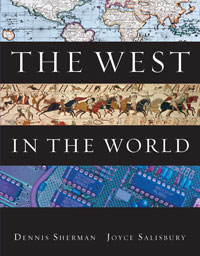 
The West in the World, 4th Edition (Sherman)Chapter 23:
Darkening DecadesCritical Thinking Questions- Trying to Recover From the Great War, 1919-1929
- What types of economic problems plagued European governments after the war?
- What kinds of nationalist problems did the British Empire face?
- What internal problems weakened the newly created Weimar Republic?
- What were some of the signs that Western economies were improving after 1924?
- How did post-war popular culture reflect political and economic changes and the concerns of modern society?
- How did attitudes toward sex change, and how were these changes reflected in popular culture?
- What themes did post-war high culture express? How did artists and authors voice feelings of insecurity and crisis?
- Turning Away From Democracy: Dictatorships and Fascism, 1919-1929
- What economic problems did the new eastern and central European democracies face immediately after the war?
- Explain fascist ideological and political views.
- Why was Italy disappointed by the Treaty of Versailles?
- What kinds of economic problems and social disorders threatened post-war Italy?
- Which groups were attracted to Mussolini's fascism?
- After being appointed Italian prime minister in 1922, how did Mussolini build a dictatorship?
- How did Mussolini organize the economy and relations between labor and management?
- Transforming the Soviet Union: 1920-1939
- What steps did Lenin and the Communist Party take to build a socialist society during the 1920s?
- How did the political views of Trotsky, Bukharin, and Stalin differ in the mid-1920s?
- After Lenin's death, how did Stalin rise to the head of the Communist party?
- What policies did Stalin employ to rapidly industrialize and modernize the Soviet Union's economy? How successful were those policies?
- What role was collectivization supposed to play in the rapid industrialization of the Soviet Union? What results did collectivization actually produce?
- How did the Soviet state attempt to mobilize society as it industrialized?
- What effect did the Great Purges have on Soviet society?
- The Great Depression, 1929-1939
- What caused the economic collapse known as the Great Depression?
- How did both societies and governments react to the economic hardships of the depression?
- Nazism in Germany
- What beliefs did Hitler expound upon in Mein Kampf?
- How did the German economic and political situation contribute to the rise of the Nazi Party?
- To what groups did Nazi doctrine appeal and why?
- How did Hitler consolidate his dictatorship?
- How did Nazi policies attempt to shape family and private life, as well as emotions and culture? What values were promoted?
- What actions and policies were taken against German Jews and other "community aliens" during the 1930s?
 |  |
|





